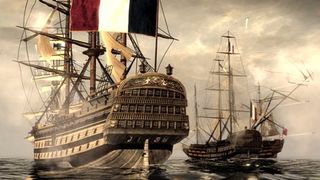Some people, after reading our review of Empire: Total War, wanted to string us up and splice our main brace. We can’t help it if the bugs other people experienced didn’t happen to us. Still, it’s safe to say that there were some problems that perhaps could and should have been sorted out before release – specifically the AI’s total lack of ability to perform invasions over a stretch of water.

Of course, that and other issues have been fixed, tweaked and patched over since release. It’s safe to say it’s a more stable release than it was originally, even if some of us still haven’t had any issues of note. And now comes Napoleon: Total War, the first ‘expandalone’ in the franchise’s history. This English-mangling corporate buzzword means that you don’t need the original Empire to play Napoleon, but if you do own it, some of Napoleon’s whiz-bang new features will integrate into Empire. The stunted Corsican with delusions of grandeur won’t have any restrictions imposed upon his quest for glory, then.
Napoleon will be much more story-driven than Empire, akin to the Alexander expansion for Rome: Total War. The first of the three different campaigns will focus on Italy (1796), detailing the small general’s rise to prominence. The setting then shifts to the Middle East (1798), before moving to the Grand European theatre (1805-1812), where he invites everyone to rumble.
Creative Assembly say they are drawing inspiration, especially for the first two campaigns, from the Road to Independence bit of Empire, while retaining a lot of the core concepts from the main chunk of the game.

Turns have been chopped down to two-week periods in a bid to reflect the more micro-historical aspect of the events in question. This also applies to the way the campaign maps have been drawn up, focusing not so much on large regions with a big city plonked in the middle, but on smaller areas, villages and towns. Three different types of settlement will be available, focusing on either economic, industrial or intellectual pursuits. As you might have guessed, this will also necessitate the introduction of new technology research trees, both to reflect this change in the infrastructure and to cater to inventions and advances that had been made at the beginning of the 19th Century.
